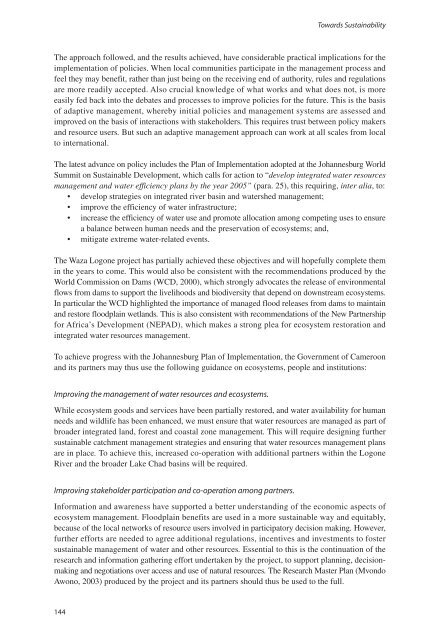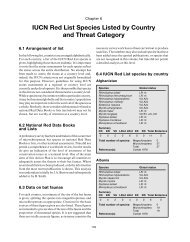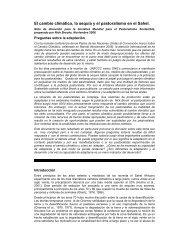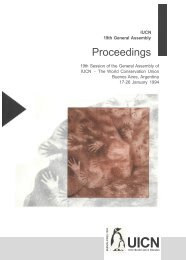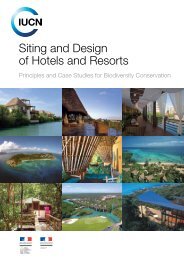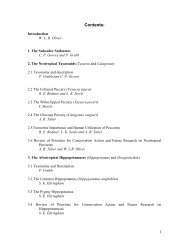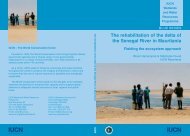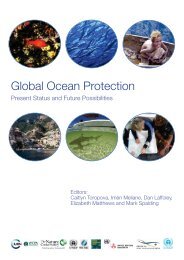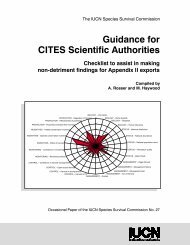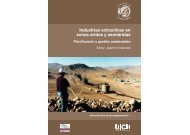The return of the water - IUCN
The return of the water - IUCN
The return of the water - IUCN
Create successful ePaper yourself
Turn your PDF publications into a flip-book with our unique Google optimized e-Paper software.
<strong>The</strong> approach followed, and <strong>the</strong> results achieved, have considerable practical implications for <strong>the</strong><br />
implementation <strong>of</strong> policies. When local communities participate in <strong>the</strong> management process and<br />
feel <strong>the</strong>y may benefit, ra<strong>the</strong>r than just being on <strong>the</strong> receiving end <strong>of</strong> authority, rules and regulations<br />
are more readily accepted. Also crucial knowledge <strong>of</strong> what works and what does not, is more<br />
easily fed back into <strong>the</strong> debates and processes to improve policies for <strong>the</strong> future. This is <strong>the</strong> basis<br />
<strong>of</strong> adaptive management, whereby initial policies and management systems are assessed and<br />
improved on <strong>the</strong> basis <strong>of</strong> interactions with stakeholders. This requires trust between policy makers<br />
and resource users. But such an adaptive management approach can work at all scales from local<br />
to international.<br />
<strong>The</strong> latest advance on policy includes <strong>the</strong> Plan <strong>of</strong> Implementation adopted at <strong>the</strong> Johannesburg World<br />
Summit on Sustainable Development, which calls for action to “develop integrated <strong>water</strong> resources<br />
management and <strong>water</strong> efficiency plans by <strong>the</strong> year 2005” (para. 25), this requiring, inter alia, to:<br />
• develop strategies on integrated river basin and <strong>water</strong>shed management;<br />
• improve <strong>the</strong> efficiency <strong>of</strong> <strong>water</strong> infrastructure;<br />
• increase <strong>the</strong> efficiency <strong>of</strong> <strong>water</strong> use and promote allocation among competing uses to ensure<br />
a balance between human needs and <strong>the</strong> preservation <strong>of</strong> ecosystems; and,<br />
• mitigate extreme <strong>water</strong>-related events.<br />
<strong>The</strong> Waza Logone project has partially achieved <strong>the</strong>se objectives and will hopefully complete <strong>the</strong>m<br />
in <strong>the</strong> years to come. This would also be consistent with <strong>the</strong> recommendations produced by <strong>the</strong><br />
World Commission on Dams (WCD, 2000), which strongly advocates <strong>the</strong> release <strong>of</strong> environmental<br />
flows from dams to support <strong>the</strong> livelihoods and biodiversity that depend on downstream ecosystems.<br />
In particular <strong>the</strong> WCD highlighted <strong>the</strong> importance <strong>of</strong> managed flood releases from dams to maintain<br />
and restore floodplain wetlands. This is also consistent with recommendations <strong>of</strong> <strong>the</strong> New Partnership<br />
for Africa’s Development (NEPAD), which makes a strong plea for ecosystem restoration and<br />
integrated <strong>water</strong> resources management.<br />
To achieve progress with <strong>the</strong> Johannesburg Plan <strong>of</strong> Implementation, <strong>the</strong> Government <strong>of</strong> Cameroon<br />
and its partners may thus use <strong>the</strong> following guidance on ecosystems, people and institutions:<br />
Improving <strong>the</strong> management <strong>of</strong> <strong>water</strong> resources and ecosystems.<br />
While ecosystem goods and services have been partially restored, and <strong>water</strong> availability for human<br />
needs and wildlife has been enhanced, we must ensure that <strong>water</strong> resources are managed as part <strong>of</strong><br />
broader integrated land, forest and coastal zone management. This will require designing fur<strong>the</strong>r<br />
sustainable catchment management strategies and ensuring that <strong>water</strong> resources management plans<br />
are in place. To achieve this, increased co-operation with additional partners within <strong>the</strong> Logone<br />
River and <strong>the</strong> broader Lake Chad basins will be required.<br />
Improving stakeholder participation and co-operation among partners.<br />
Information and awareness have supported a better understanding <strong>of</strong> <strong>the</strong> economic aspects <strong>of</strong><br />
ecosystem management. Floodplain benefits are used in a more sustainable way and equitably,<br />
because <strong>of</strong> <strong>the</strong> local networks <strong>of</strong> resource users involved in participatory decision making. However,<br />
fur<strong>the</strong>r efforts are needed to agree additional regulations, incentives and investments to foster<br />
sustainable management <strong>of</strong> <strong>water</strong> and o<strong>the</strong>r resources. Essential to this is <strong>the</strong> continuation <strong>of</strong> <strong>the</strong><br />
research and information ga<strong>the</strong>ring effort undertaken by <strong>the</strong> project, to support planning, decisionmaking<br />
and negotiations over access and use <strong>of</strong> natural resources. <strong>The</strong> Research Master Plan (Mvondo<br />
Awono, 2003) produced by <strong>the</strong> project and its partners should thus be used to <strong>the</strong> full.<br />
144<br />
Towards Sustainability


